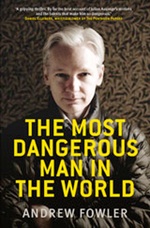A couple weeks ago I wrote that Andrew Fowler’s biography of WikiLeaks’ Julian Assange, The Most Dangerous Man in the World, was failing to impress. I persisted reading, however, and things got better.
My main gripe then was that just 41 pages into the narrative I was getting the distinct impression that Melbourne University Press hadn’t assigned an editor who had the faintest grasp of internet technology, history and culture. I listed a bunch of what, to me, were glaring errors.
However once we get past Assange’s earlier hacker life and into more recent material, which is more about interpersonal relationships and international politics, the book is significantly stronger. Indeed, The Most Dangerous Man in the World does a good job of tying together the various threads of the Assange and WikiLeaks stories, and even buries on page 217 an important revelation — if it is a revelation.
I have been reliably told that ASIO played an active part in the investigation into Assange, trawling through his life and activities in Australia. But what must be just as worrying for him, and has also never been revealed before, is the fact that the inquiry also included officers from ASIS, Australia’s overseas intelligence agency, which has strong links with the US.
Personally I’m not surprised by that news one bit. That’s just the intelligence organisations doing their jobs of investigating perceived threats to national security, as should be expected. But given how some folks get all frothed up whenever they discover that spooks are involved, I’m wondering why this wasn’t given more prominence.
The book still has some curious wording, such as on page 147 where WikiLeaks is described as “a child of the anarchic blogosphere”. I’m not sure that’s the right heritage to stress and, as I wrote before, Robert Manne’s free-to-read essay in The Monthly does a much better job of capturing Assange’s and WikiLeaks’ cypherpunk roots. On page 165 there’s a reference to “what’s known as the DefCon conference”, as if there’s some doubt as to the name of one of the longest-running and most-respected hacker events on the planet. And there’s still plenty of that sloppy editing I referred to, such as the Chaos Computer Club being explained twice.
Nevertheless, reading The Most Dangerous Man in the World will give you the core narratives. Just be aware that the technical and cultural descriptions are wobbly, and use it to get the timelines straight in your head.

